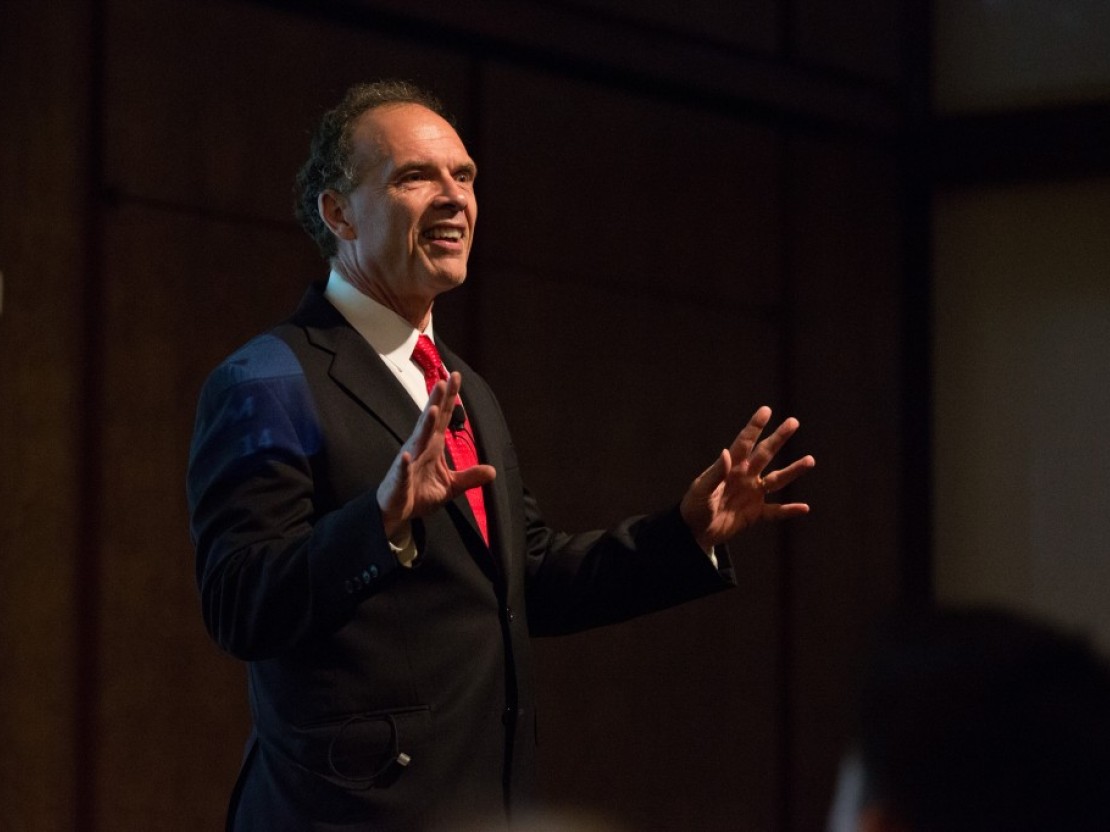Pitney is Roy P. Crocker Professor of American History and Politics and the author of several books on American politics, including two cowritten with CMC’s Crown Professor of Government Andrew Busch and University of Virginia Professor James W. Ceaser. He is the author of numerous scholarly articles, essays, and newspaper/magazine articles, and he writes a regular blog for The Christian Science Monitor. He also has served as the acting director for the Research Department of the Republican National Committee (1990-1991) and as the senior domestic policy analyst for the U.S. House Republican Research Committee. The following edited excerpts are taken from the Q&A portion of his talk. Also, see video of the entire talk.
Regarding campaign ads—a lot of the money that political candidates need to raise goes towards television ads, and people in my generation don’t watch television as much. We are able to fastforward past ads. Many of us have probably never seen those ads. I was wondering if candidates will be able to raise less money or spend their money differently in the future, and if you see changes in that spending now?
Pitney: The answer is something we started to see in a serious way in 2012, and that’s digital advertising. Increasingly, campaigns are putting money into digital advertising. For example, a lot of you may have noticed campaign pop-ups on Facebook—that’s not an accident, and the campaign pop-up on Facebook just happened to coincide with things you’re interested in. You might say, “Oh, wow, isn’t that a coincidence?” No, it’s not a coincidence. It’s the result of campaigns spending lots of money on people who know a lot about Facebook and about algorithms to bring you that particular ad. So, you’re quite right, a lot of people are not watching over-the-air television, but they’re getting hit by advertising through different means.
One of the economic statistics you pointed to showed that, while the middle class is struggling, the one percent is doing just fine. This is something that at least Elizabeth Warren is talking about, and I’m wondering if other Democrats across the country have tried to capitalize on these growing trends, and if they have, why hasn’t it been more effective?
Pitney: The Democrats at the national level are raising lots of money from the one percent. Consequently, somebody like Hillary Clinton, who has very close ties with the business and financial community, may have a lot of difficulty in raising the issue of wealth inequality. This is a potential avenue for somebody like Elizabeth Warren or possibly Martin O’Malley to come at her from the left. I think that we could see a real battle in 2016. I know everybody’s assuming it’s Hillary Clinton’s race to lose and she is a lock for the nomination. Well, guess what? Eight years ago, people were saying exactly the same thing, and it didn’t work out that way. So, we’ll just have to see how it plays out. I think the issue of inequality is going to be with us for a long time. It is going to play a part in politics on the Democratic side with somebody like Elizabeth Warren. On the Republican side, it’s very interesting—one guy some folks are talking about is Mike Huckabee. I realize Mike Huckabee isn’t necessarily the first person you think about when you think about 2016 candidates, but keep an eye on him. He is very clear on this issue. He is talking in very direct terms about the plight of the middle class, and talking about globalization and its effect on jobs. It’s the kind of appeal that would go far in the Republican primary campaign.
It’s been taken as a given that the Republicans will maintain control [of the House of Representatives after the midterms]. If that’s the case, how is it that the Democratic Congressional Campaign Committee (DCCC) has been out-fundraising the National Republican Congressional Campaign (NRCC) so far?
Pitney: First, President Obama is the president, and the in-party has some pretty substantial fundraising advantages. That was true when either Bush was president. Second, the DCCC has technological superiority over the NRCC. Also, I mentioned the support of Democrats among wealthy people, not only the mega-donors—Democrats are doing well among the whole one percent, not just the one percent of the one percent, but the broad one percent. So it’s not surprising that the Democrats are doing well in fundraising. Although…that figure has an asterisk next to it because it doesn’t necessarily account for all of the dark money going into the election, and we’re not going to know about that for some weeks.
What effect do you think this election will have on the current gridlock and political climate in Washington?
Pitney: The gridlock will continue. [If Republicans maintain control of the House of Representatives and] gain control of the Senate, it will be by a vote or two: They will not come close to the 60 votes they would need to break a legislative filibuster. If the Democrats maintain control of the Senate, it’s pretty much the status quo, and if you liked the last few years, you’ll love the next two. And even if Obama’s numbers were better, the last two years of a presidency seldom bring major legislation. So, even in the best-case scenario, Obama’s legislative presidency is going to be over anyway. A president’s major accomplishments in the last two years tend to be in the field of foreign policy and national security, and as we all know from watching the news, this is an area of tremendous uncertainty. It could go well, we all pray it does go well for our country’s sake, but it could go in the other direction too.
